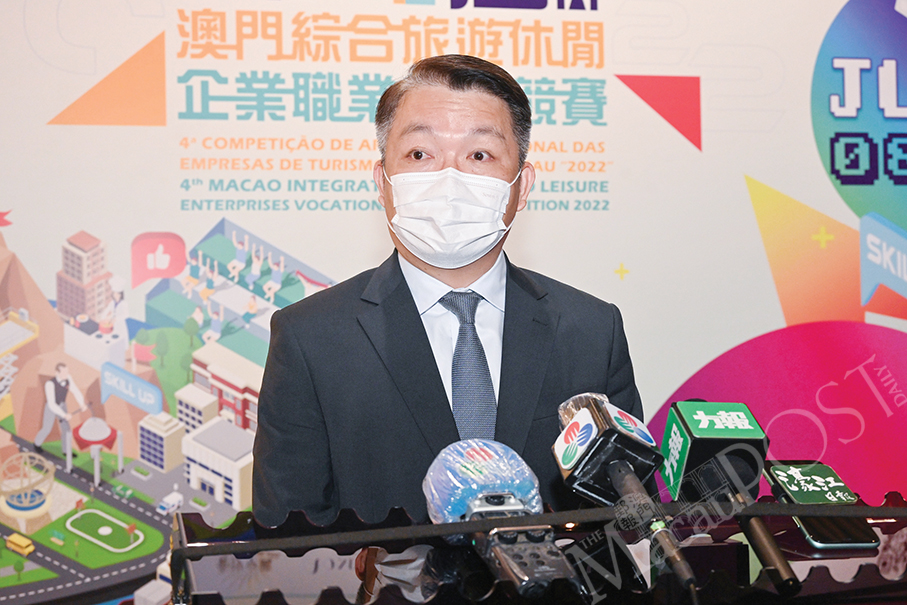Secretary for Economy and Finance Lei Wai Nong said yesterday that the government will not come up with an “exact” figure in its revised forecast for Macau’s gross gaming revenue (GGR) for the remainder of the year.
The policy secretary also said that the government expects the second half of this year to be a “golden period” for Macau’s tourism industry, as long as the overall COVID-19 situation in the mainland remains stable.
Lei made the remarks while speaking to reporters after attending yesterday’s opening ceremony of the “4th Macau Integrated Tourism & Leisure Enterprise Vocational Skills Competition 2022” at MGM Cotai.
Chief Executive Ho Iat Seng told reporters on Monday that the local government will “surely” adjust its original forecast for this year’s GGR of 130 billion patacas as Macau’s gaming industry has been hard hit by the economic impact of local COVID-19 transmissions in various areas in the mainland over the past few months. Consequently, Ho said, the government will submit another 2022 budget amendment bill to the Legislative Assembly (AL) in the second half of this year.
Ho said on Monday that the amount of the revised GGR forecast will be assessed by Lei.
In the first five months of this year, according to official statistics, Macau’s GGR was down by 44 percent year-on-year to 23.79 billion patacas, which was equivalent to only 18.3 percent of the government’s 130 billion-pataca forecast. Five months account for 41.7 percent of the length of a year.
Speaking to reporters yesterday, Lei noted that at the end of last year the government forecast Macau’s GGR to reach 130 billion patacas in 2022, but GGR in the first five months of this year “had a certain level of difference with the government’s estimates”.
Lei noted that after having a relatively good performance in the first two months, GGR in March started to be adversely impacted by “uncertainty resulting from changes in the overall COVID-19 situation in the mainland”.
Consequently, Lei said, the government expects to submit a 2022 budget amendment bill to the legislature in the second half of this year.
The legislature passed the government’s first budget amendment bill for this year in April.
As long as the overall COVID-19 situation in the mainland becomes more stable, Lei said, the local government will intensify its campaign to expand the range of visitor sources, extend visitors’ length of stay in Macau, and attract them to visit Macau again.
Nevertheless, when replying to media questions, Lei said that the government will not come up with an “exact” amount in its revised GGR forecast for the remainder of this year.
The policy secretary underlined that Macau’s economic performance is “closely related” to the number of visitors, adding that the government will make good use of various channels to attract more visitors as long as the COVID-19 situation in the mainland and other neighbouring regions remains stable.
Furthermore, Lei also noted that the government helped 3,277 unemployed locals find jobs in the first five months of this year.
No interference in satellite casinos’ commercial decision-making
Meanwhile, Lei underlined that the government will not interfere in the so-called satellite casinos’ commercial decision-making as to whether to wind down their operations. He was quick to add that in general the government wants the existing satellite casinos to continue to operate in order to maintain Macau’s economic “momentum” and help relieve its unemployment situation.
Lei underlined that whether certain satellite casinos continue to operate is their respective commercial decision based on their assessments of the COVID-19 situation and its impact on the local economy, and has nothing to do with the government’s gaming industry amendment bill.
Two gaming industry sources told The Macau Post Daily last week they expected “around seven” of Macau’s 18 satellite casinos to close down this year.
Analysts have pointed out that there is no legal definition of a “satellite casino”. They have described a satellite casino as being owned and run by a third party “at the behest of” of any of Macau’s six gaming companies operating under concessions or subconcessions granted by the government. Despite operating in a grey area of the law, the satellite casinos have been accepted as a fait accompli by the government for decades.
At the end of the first quarter, Macau had 42 casinos, four of which (all of them owned by SJM) had been suspended, according to the website of the Gaming Inspection and Coordination Bureau (DICJ). The figure comprises both casinos owned and run by Macau’s six gaming operators and the city’s 18 satellite casinos owned and run by third-party operators, which would account for 42.8 percent of the total number of casinos listed by the bureau.
“Satellite casinos are a specificity of Macau’s gaming industry,” a local lawyer told The Macau Post Daily last week.

Secretary for Economy and Finance Lei Wai Nong talks to reporters after attending yesterday’s opening ceremony of the “4th Macau Integrated Tourism & Leisure Enterprise Vocational Skills Competition 2022” at MGM Cotai.
Photo: GCS




